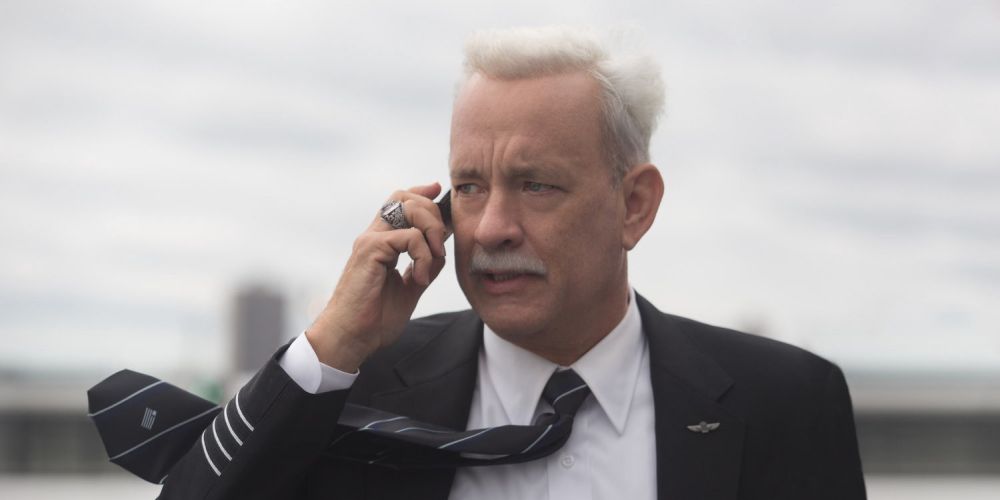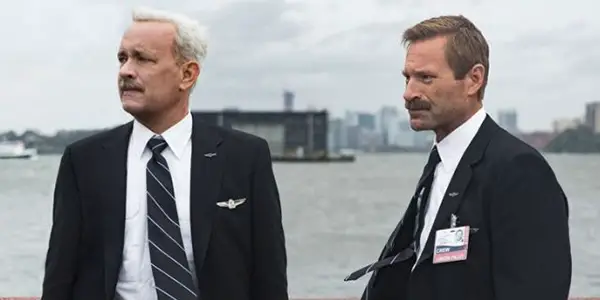SULLY: A Subtle, Satisfying Character Study

David is a film aficionado from Colchester, Connecticut. He enjoys…
I still fondly remember the day that was subsequently christened the “Miracle on the Hudson”, when it was discovered that a plane successfully landed on the Hudson River after an incident in the air when both engines were destroyed. Amazingly, everyone on board survived. It was one of the first times I had heard of something like this happening, and I would say that most of America, if not the world, was equally spellbound.
With such a remarkable story, it really was only a matter of time before Hollywood would get their hands on it. Predicting this, I was sure that the film based on the incident would be an overly sentimental, hyper-embellished portrayal (as many based-on-a-true-story Hollywood productions are). I am pleased to say that my predictions were wrong. Though Sully doesn’t push too far outside the boundaries of its genre, it still manages to be a subtle, understated representation of a very grandiose achievement.
The Miracle on the Hudson
Most of us know the story already, so I’ll sum it up briefly: Sully focuses on an incident back in January of 2009 when a commercial airline from NYC with a destination of Charlotte, North Carolina crashed into a large flock of birds shortly after takeoff. The birds subsequently got caught in both engines, resulting in complete loss of thrusting power for the aircraft. With limited time to return to a nearby airport, Captain Sully (played by Tom Hanks) was forced to make an emergency water landing in the Hudson River. Nearby boats rescued the passengers and crew after the landing, and, miraculously, everyone on board survived.
Much of Sully focuses on the immediate aftermath of the incident, when Captain Sully and First Officer Jeffrey Skiles (Aaron Eckhart) are being investigated by the National Transportation Safety Board (NTSB) to determine if the emergency water landing was warranted under the circumstances, or if, alternatively, the plane would have been able to safely make it back to an airport. Flashes of the actual incident are shown in-between these hearings, slowly painting a picture of what actually happened during those 208 seconds in the air.

It was an interesting choice by director Clint Eastwood to not start Sully with the actual plane incident, and instead begin in the days that followed. Even when flashing back, only brief clips are shown at a time; for instance, one flashback focuses on the time leading up to takeoff and to hitting the birds in midair, while another is an extended sequence of the water rescue. Still more clips focus on Sully’s first interest in flying planes as a kid, and another with an avoided incident while flying a jet.
The entirety of those 208 seconds in the air, from takeoff to landing, are not actually shown until the last few minutes of the film. Like an experienced poker player with a surefire winning hand, Eastwood was smart to slow-play the actual incident itself, not revealing what is likely the most exciting part of the film right from the start. Such an aspect is part of what bothered me about the similar Flight; because that film began with the tense, nail-biting airline crash, almost everything else that followed was inevitably going to feel slight in comparison.
It’s also thematically significant that the unbroken scene isn’t shown until the end, because at this point the full scope of it has been revealed – not only have we gained more of a sense of the character of Sully, but we also see that the choice he made was not only admirable but actually the only one that could have resulted in the best possible outcome. The scene feels more righteous at this point because we now know that his full praise is deserved.
The Conflict
After seeing Sully, I was scrolling through a few articles about it and noticed some that expressed the NTSB’s objections to their portrayal in the film. Portrayed by Mike O’Malley and Anna Gunn, among others, the group seems to operate more as prosecutors as opposed to investigators. They question Sully, insinuating that he may have made the wrong decision to land in the Hudson, despite the fact that the incident was casualty-free. Through simulations, they determine that Sully could have made it back to one of two airports.

The objections here were that the NTSB never questioned Sully in a scrutinizing way, and only asked what was required under the circumstances. The film even goes to the length of holding a hearing for both Sully and his First Officer, where they are required to speak out in their own defense. It, of course, ends well for them as we know, but the conflict in the film itself is very much a fabrication.
As an observer, though, I don’t see this choice by the filmmakers as an inherently negative one. With a film that is almost solely about an incident that turned out well (under the circumstances), there had to be at least some plot-stretches in order to create a more fully-rounded narrative. Such a decision for the conflict did make the film feel very much like a lighter version of the aforementioned Flight, but the fact that it is present at all is not necessarily a detriment.
At its heart, Sully is really meant to be a character study.
The Character Study
Throughout Sully, we catch small glimpses of who he is as the film progresses. Sully is not only dealing with the immediate aftermath of the incident and the investigation by the NTSB, but, in addition, the surrealness of suddenly becoming a recognizable celebrity. For the first time in his life, people greet and praise him as a hero. Yet, Sully himself never thought that he was more than just an ordinary person reacting in an extraordinary circumstance.

To that end, it’s significant that Tom Hanks was chosen to play the role. Known throughout the years as the purest representation of the “everyman” (though actually a much more sophisticated method actor than the term gives him credit for), Hanks has the required likability and charm to play Sully. It is not only in the tense scenes on the plane where Hanks is believable, though, it is through the subtleties that he really shines.
Take the emotionally gripping aftermath of the water landing, for instance. Sully is determined to ensure the rescue of all the passengers from his plane, yet through the confusion of multiple boats rescuing the passengers, they are unable to get a full number of how many people made it. When Sully finally discovers that the final tally is the exact number of passengers and crew onboard, the look of unbridled relief on Hanks’ face is undeniable, seen through just a relaxation in his face and slightly watered eyes. Any other actor would have turned the drama level up to 11, but Hanks knowingly and admirably succeeds much more effectively through his nuances.
The Full Scope
The subtleties in Sully are surprising as a whole, especially given the production team behind it. Clint Eastwood‘s films have been known to overly dramatize their subjects for some other more-obvious purpose. For example, his past film American Sniper very much tries to push its pro-war, nationalistic agenda. There are inklings of patriotism within Sully, such as a line delivered by one of the water rescue workers, who states that this is very easily the best instance of planes crashing in NYC, bringing to mind the awful events of 9/11. In a sense, the miracle of Sully could be seen as the bright light in the city, which shines through the overwhelming darkness of that day.
Thankfully, the film does not push too far in that direction, nor does it step into the realms of over-sentimentality. Sully exists mostly as a way to revisit an inspiring moment of the past few years, and to relish in the overall hopefulness that resonated from it, not only with the actions of the captain but for the crew involved in the subsequent water rescue afterwards. It is a small glimpse into what we can accomplish during the most perilous of circumstances, and for that reason, it is an effectively wrought portrayal.
Conclusion
To conclude, Clint Eastwood‘s Sully is a satisfyingly level-headed film. It might not be as remarkable when compared to either Eastwood‘s career as a whole, or even when compared to other, more distinctive airplane thrillers (United 93, for instance). Yet, for a film that could have easily overreached beyond its scope and attempted to tug at the heartstrings as opposed to plainly and simply tell a story in an effective way, it should be celebrated.
I recently saw the real Captain Sully on The Late Show with Stephen Colbert, when he was discussing the upcoming film about him. He was awestruck about it, exclaiming it’s not everyday that you get to be portrayed by Tom Hanks, and in a film directed by Clint Eastwood, no less. His actions on that day in January, 2009, though, were a truly remarkable feat of humanity. In Sully, he is rightfully honored.
What are some of your favorite based-on-a-true-story films?
Sully is out now in the United States and will be released in the UK on December 2. For all international release dates, click here.
Does content like this matter to you?
Become a Member and support film journalism. Unlock access to all of Film Inquiry`s great articles. Join a community of like-minded readers who are passionate about cinema - get access to our private members Network, give back to independent filmmakers, and more.
David is a film aficionado from Colchester, Connecticut. He enjoys writing, reading, analyzing, and of course, watching movies. His favorite genres are westerns, crime dramas, horror, and sci-fis. He also enjoys binge-watching TV shows on Netflix.













